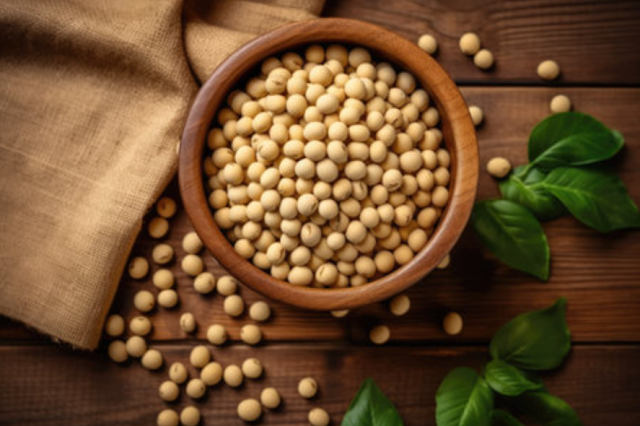Harnessing the Power of Soybeans: A Comprehensive Guide to Battling High Blood Pressure and Cholesterol
Harnessing the Power of Soybeans: A Comprehensive Guide to Battling High Blood Pressure and Cholesterol
High blood pressure (hypertension) and elevated cholesterol levels are two of the most significant risk factors for heart disease, a leading cause of death worldwide. While medication plays a role in managing these conditions, dietary choices can also have a profound impact on reducing blood pressure and cholesterol. One versatile and powerful food that has gained attention for its potential cardiovascular benefits is soybeans. In this comprehensive article, we will explore the benefits and risks of incorporating soybeans into your diet, discuss how much soy to eat for optimal results, and highlight Nobel-worthy advancements in cardiovascular research related to soy and heart health.
Understanding High Blood Pressure and Cholesterol
- High Blood Pressure (Hypertension):
- Hypertension is a condition in which the force of blood against the walls of the arteries is consistently too high.
- Over time, high blood pressure can damage the arteries, increasing the risk of heart disease, stroke, and other health issues.
- Cholesterol:
- Cholesterol is a waxy substance found in your blood and cells. While it's essential for various bodily functions, too much LDL (low-density lipoprotein) cholesterol, often called "bad" cholesterol, can build up in your arteries, forming plaque.
- Plaque narrows and clogs the arteries, leading to atherosclerosis, which increases the risk of heart attacks and strokes.
The Power of Soybeans: Benefits
Soybeans, a legume native to East Asia, have gained recognition for their potential cardiovascular benefits:
- Heart-Healthy Fats:
- Soybeans are rich in unsaturated fats, including polyunsaturated and monounsaturated fats, which can help lower LDL cholesterol levels when they replace saturated fats in the diet.
- Plant Sterols and Stanols:
- Soybeans contain plant sterols and stanols that can reduce the absorption of cholesterol from the digestive tract, further lowering LDL cholesterol.
- Soluble Fiber:
- The soluble fiber in soybeans can help lower LDL cholesterol levels by binding to cholesterol in the gut and promoting its excretion.
- Protein Source:
- Soybeans are an excellent source of plant-based protein, making them a heart-healthy alternative to animal protein sources.
- Isoflavones:
- Soybeans contain phytochemicals called isoflavones, which may have antioxidant and anti-inflammatory properties that benefit heart health.
Considerations and Risks
While soybeans offer many potential benefits for heart health, it's essential to be mindful of certain considerations and potential risks:
- Allergies:
- Soy allergies are not uncommon. Individuals with soy allergies should avoid soy products or consult with an allergist before including soy in their diet.
- Phytoestrogens:
- Soy is rich in phytoestrogens, which have weak estrogen-like effects. Some individuals, particularly those with hormone-related conditions, may want to moderate their soy intake.
- Processing:
- Highly processed soy products, such as some veggie burgers and soy-based desserts, may contain added sugars, unhealthy fats, and preservatives. Opt for minimally processed options.
- Goitrogens:
- Soybeans contain goitrogens, compounds that can interfere with thyroid function. If you have thyroid issues, consult your healthcare provider before adding soy to your diet.
How Much Soy to Eat for Optimal Results
The American Heart Association recommends incorporating soy into a heart-healthy diet in the following ways:
- Whole Soy Foods:
- Incorporate whole soy foods such as edamame, tofu, tempeh, and soy milk (unsweetened) into your meals.
- Aim for at least two servings of whole soy foods per day.
- Soy Protein:
- Replace some animal protein sources with soy protein, such as tofu or tempeh, in your diet.
- Approximately 25 grams of soy protein per day may help reduce LDL cholesterol levels.
- Soy Nuts:
- Snack on roasted soy nuts, which are a convenient and heart-healthy option.
- Soybean Oil:
- Cook with soybean oil, which is low in saturated fat and high in unsaturated fats.
- Use soybean oil as a substitute for oils high in saturated fats.
Nobel-Worthy Advancements in Cardiovascular Research Related to Soy
Nobel-worthy advancements in cardiovascular research continue to uncover the potential benefits of soy in heart disease prevention and management:
- Isoflavones and Arterial Health: Nobel-worthy studies investigate how isoflavones in soy may improve arterial health, reduce inflammation, and lower the risk of atherosclerosis.
- Soy and Blood Pressure: Research explores the effects of soy on blood pressure regulation and its potential to reduce hypertension.
- Genetic Factors: Nobel-worthy efforts aim to identify genetic factors that determine individual responses to soy-based interventions, leading to personalized dietary recommendations.
- Soy and Heart Disease Risk: Ongoing research evaluates how incorporating soy into the diet affects heart disease risk factors, including cholesterol levels, triglycerides, and blood sugar.
Conclusion
Soybeans, a versatile and heart-healthy food, offer numerous potential benefits for individuals seeking to battle high blood pressure and cholesterol. Incorporating whole soy foods, moderating intake based on individual considerations, and staying mindful of processing are key to reaping these benefits. Nobel-worthy advancements in cardiovascular research continue to shed light on the potential of soy in preventing heart disease, offering hope for more targeted and personalized approaches to heart health in the future.

















No comments